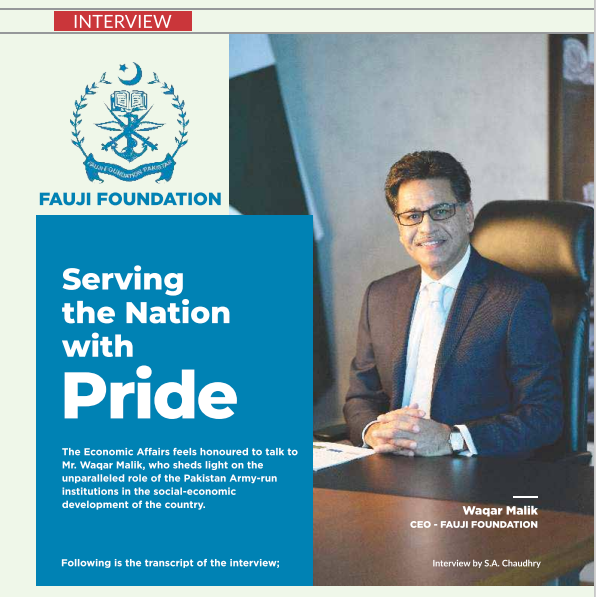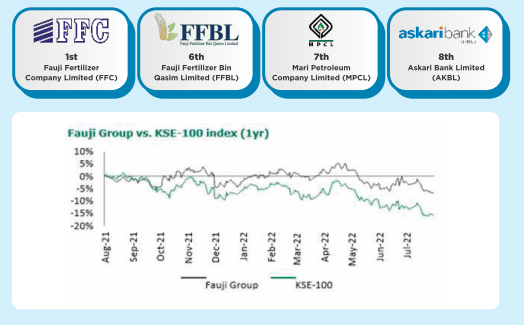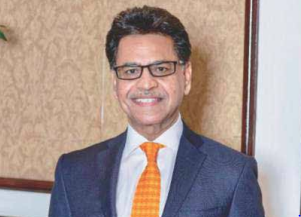
Waqar Malik
CEO – FAUJI FOUNDATION
The Economic Affairs feels honoured to talk to Mr. Waqar Malik, who sheds light on the unparalleled role of the Pakistan Army-run institutions in the social-economic development of the country.
Following is the transcript of the interview;
The Economic Affairs: Sir, would you like to share the success story of Fauji Foundation since it was founded in 1954, and highlight achievements of its subsidiary companies as well.
Waqar Malik: Fauji Foundation (FF or “The Foundation”) is a charitable trust founded in 1954 and incorporated under The Charitable Endowment Act 1890. The raison d’etre of Foundation is “Earn to Serve”. The Foundation operates as a Hybrid Social Enterprise, where its social mission of provision of welfare services to veterans and their dependents is entirely financed through commercial investments.
The post war repatriation fund of PKR 18.2 million, left by the British government for the Pakistan veterans, was utilized to set up the Foundation over one off distribution. Thus, it was the start of an incredible journey of socially driven organization fully self-sustained by its commercial investments that also supplements Pakistan`s National Economic Development.

The core purpose of the Foundation is to support the veterans and their families, including widows and Shuhadas for their rehabilitation. Fauji Foundation proudly spearheads this mantle entirely on self -sustaining basis and today, FF is one of the largest Social Hybrid Enterprise in Pakistan.
Fauji Foundation Education System (FFES) has a country-wide presence with 122 academic institutions with around 70,000 students. The strength of schools/colleges faculty currently stands at 2,800.
Our Journey and growth from 50-bedded hospital in 1959 to nationwide 1,830 beds across 74 medical facilities which include 11 Hospitals & 63 Clinics and 126 Educational Institutes comprising of a University, Medical, Dental and Nursing colleges, Tertiary, Colleges & School and Vocational Training Institutions demonstrate our commitment and devotion towards the core purpose. FF provides these welfare & social services with annual spending of about PKR 10-12 billion, which saves public funds otherwise the Government would have to fund these activities. FF is poised to serve entitled 9.7 million beneficiaries, about 5% of the population.
The post war repatriation fund and returns are prudently invested in the sectors of agriculture, infrastructure, food chain, energy and financial services. Most commercial investments are listed on Pakistan Stock Exchange and run with the highest level of corporate governance and integrity. The Group contributes about Rs 160 billion per annum in the form of duties and taxes to the national exchequer and ranks as one of the largest tax payers in Pakistan.
The Economic Affairs: Sir, being biggest welfare trust and business conglomerate, how much investment has been made by Fauji Foundation in its 18 industrial and other businesses. What is the contribution towards GDP and impact on economy, besides welfare of 9 million ex-servicemen beneficiaries?
Waqar Malik: Fauji Foundation started its commercial investments with merely PKR 18.2 million by venturing into cereals and textile and has grown to over PKR 700 billion of assets in sectors such as Agriculture & Food, Oil & Gas exploration & Energy, Cements & Construction, Commercial Banking, and Infrastructure. The Group is the largest in Pakistan in terms of market capitalization. Most commercial investments are quoted on the PSX and over the years, these have generated handsome returns for their minority shareholders (50% of our dividends go to the general public who are our shareholders).

Apart from funding our welfare activities, these investments also contribute in the Economic Development of Pakistan by focusing on the Nations’ pressing needs, such as, food self-sufficiency, nutritional needs, energy security, infrastructure development and financial inclusivity of the population.
The Economic Affairs: How much employment is provided by Fauji Foundation and the role it is playing in human resource development for the growth corporate sector of Pakistan?
Waqar Malik: The workforce in Pakistan is relatively efficient, reliable, cost-effective, and easily adaptable to various working conditions and cultures. This is the reason that our skilled workers are providing their services around the globe. Our government is working relentlessly towards the development of manpower through numerous skill development initiatives. These initiatives are aimed at meeting skill requirements of both the national and international labor market standards.
Fauji Foundation is also contributing towards the cause by sharing a reasonable portion of the job market in Pakistan, employing 27,000 employees with a blend of civilians, ex-servicemen, and beneficiaries. We are committed to fostering a diverse workforce by creating an equitable and inclusive space for all, having 45% female employees, and maintaining a 3.5% share for disabled persons, which is amongst the best in Pakistan. With a firm emphasis on this unique HR model, Fauji Foundations has transformed through the adoption of modern HR practices, automated processes, market competitive remunerations, training, creating a performance-based culture leading towards strategic HR with increased efficiency and productivity.

Fauji Foundation is not only providing employment opportunities but also contributing towards the development of national manpower through healthcare facilities, subsidized education, and vocational and technical training.
Hardship may dishearten at first, but every hardship passes away. All despair is followed by hope; all darkness is followed by sunshine.
The Economic Affairs: Sir, how successful are Fauji Foundation projects like Fauji Fertilizer, Fauji Cement, Fauji Cereals, Mari Petroleum, Askari Bank, Fauji energy projects, and other projects in Pakistan and please share their performance?
Waqar Malik: Fauji Foundation has six publicly listed companies with controlling share. The market capitalization of our listed investments is over USD 2 billion. Pakistan stock exchange (PSX) published a report on 28th March 2022 for the top performing companies in 2020. We’re pleased to announce that 4 companies appeared in the list of the top 25 companies. The companies are:
Mari Petroleum (MPCL): Mari Petroleum (MARI) is one of the largest gas producers in Pakistan with a production share of 21%. The company is aggressively expanding its exploration activities to enhance its overall production to cater for the growing needs of energy.
Fauji Fertilizer Company (FFBL): Fauji Fertilizer offers a) stable cash flow generation, b) strong dividend yield and (c) robust dividend income from various subsidiaries. It provides a hedge against macroeconomic shocks because of stable urea demand.
Fauji Cement (FCCL): FCCL has gone through a major turnaround recently. The company owns over 10% of the cement market in the North, poised to capture growth of Dams, CPEC and Afghan Exports via a new Expansion project. The focus is on operational efficiency through the installation of WHR plants and solar power plants.
Fauji Fertilizer bin Qasim (FFBL): FFBL is a sole manufacturer of DAP in Pakistan. The company has a market share of over 45% in DAP market. The rest of the demand is met by imports. The company has retired significant portion of its debt in the past two years accredited to business turnaround.
Askari Commercial Bank (AKBL): Askari Bank (AKBL) is a mid-tier commercial bank in Pakistan operating since 1992. It currently operates through 535+ branches nationwide including 101 Islamic banking branches, and commands 4.8%, and 4.5% market share of domestic deposits and advances, respectively.
The Economic Affairs: Sir, how do you see the future outlook of Fauji Foundation as well as the economy of Pakistan, keeping in view the rocky economic path of past 75 years?
Waqar Malik: Despite challenges, Pakistan’s economy is witnessing a V-shaped recovery through improved COVID 19 containment strategies. Incentives offered to the industry to minimize the impact of an industrial shutdown on labor livelihoods and continued accommodative fiscal and monetary policies which are poised to accelerate the recovery across all sectors. The performance in agriculture, large scale manufacturing (LSM), construction and export sectors are the key success factors. Looking ahead, the non-oil current account deficit is expected to decline, and exports and remittances continue to remain resilient.
The Economic Affairs: Sir, being a head of a corporate conglomerate, how do you define corporate leadership for young professionals and its role in the growth of the corporate sector?
Waqar Malik: Fauji Foundation has always functioned as a “Hybrid Social Enterprise”, where welfare is consistently funded from its self-generated resources. Being a leader of such a unique organization allows me to perceive gaps that exist within our economy and human capital. Of course, the knowledge of related imbalances is part of the package from a different angle.

Young professionals may not bring years of experience but they bring with them the determination, flexibility, and exuberance of a motivated mindset, along with fresh perspectives on old problems. They also carry with them a good comprehension of new technologies that are being applied in the corporate sector.
At the Foundation, we make it easier for young professionals to pave their way in, through our yearly Internship and Management Trainee Officer (MTO) Program. We allow them to be part of the decision-making loop from a young age, by equipping them with the right resources to get the job done. We place them in project-based team tasks to help build communication, coordination skills and insight. Thus, we encourage them to blaze their own trails in every possible way.
I would also like to say we believe that resolution, teamwork and emotional intelligence are key factors for defining true leadership.
The Economic Affairs: Based on your rich experience, what are the best practices for corporate governance and how have you implemented them at Fauji Foundation? Also share its impact on Fauji Foundation’s corporate performance.
Waqar Malik: Our corporate governance entails two levels i.e., “Policy Level” & “Executive Level” respectively. At policy level is our “Committee of Administration (COA)”, which defines the strategic direction of our enterprise, without any involvement in day to day functions. Major decisions like investments, divestments, financial and welfare operations are approved by this level.
While the executive level includes our “Central Board of Directors (CBOD)” which controls, manages, plans and directs all industrial, commercial and welfare operations as directed by COA.
The CBOD’s main function is to ensure long-term financial sustainability and growth of the organization. Our corporate governance reflects discipline, transparency, accountability and responsibility. We conduct meetings with our stakeholders frequently to apprise them of our performance.
At Fauji Foundation we stand side by side, with our shareholders who are the main drivers behind our investments. 50% of the dividends generated from our listed investments go to our public/minority shareholders.
The Economic Affairs: What steps Fauji foundation has taken for implementing IT and digital revolution in its companies? How it transformed the efficiency and performance of Fauji Foundation.
Waqar Malik: Fauji Foundation is strategically enabling the application of Enterprise Resource Planning (ERP) tools like SAP etc. to help manage business processes and applications. These ERP systems bind together a multitude of business processes and enable a steady flow of data between departments and business units. These ERP systems also help us eliminate any data duplication or misuse and further provides data integrity. Thus, enabling considered decisions.
Similarly, we also make use of Human Resource Information Systems (HRIS), which helps us collect and parse workforce related data. These systems organize key data points about our workforce, to help us ascertain and appraise our employees in a transparent way, while ensuring regulatory policy compliance throughout the organization. Some of our proprietary HRIS systems include detailed Recruitment Management Systems (RMS) to help streamline our entire recruitment process. We have also successfully implemented Performance Management Systems (PMS) to establish a transparent and a constructive way of evaluating employees and Automated Payroll Systems (APS).
In turn, the application of such systems has allowed our leadership to make timely and informed decisions, and also has helped evaluate their teams, with the needed data integrity.
The Economic Affairs: Sir what measures are introduced in Fauji Foundation projects for environmental protection?
Waqar Malik: Environmental awareness and readiness have always been at the forefront in our planning. Being the largest conglomerate in Pakistan with community-based ambitions, we take it as our responsibility to reduce our carbon footprint, by reducing fossil fuel and national grid dependency. At FF we are paving way for a “Greener Pakistan”, by introducing alternative green energy solutions around our business sites. Some of our initiatives include our exemplary wind power projects (FFCEL, and FWEL I & II), which have a combined output of 150 MW.
Being environmentally responsible, Fauji Cement Company Limited (FCCL) has introduced the initiative of “Green Cement”, where the emphasis is laid on the reduction of greenhouse gasses (CO2) during operations. We make this possible by utilizing alternative fuels and Refuse Derived Fuels (RDFs). This is where combustible components called Municipal Solid Waste (MSW) from our industrial sites are shredded, dried and burned to produce electricity.
FCCL has also successfully installed 2 x Waste Heat Recovery Power Plants (WHRPPs) of 12 MW and 9 MW respectively. These Heat Recovery Plants help utilize the excessive heat for energy generation and thereby further enable us to reduce load on the national grid. Such initiatives have helped us substitute 60% of our grid energy.
We’ve also undertaken numerous environment-friendly initiatives like introducing water recycling, rain harvesting measures and conducting massive tree plantation campaigns. Such campaigns have permitted us to reduce our Carbon footprint at all of our manufacturing sites. These efforts have also helped reduce the coal import bill to the tune of Circa 5 Million USD and paved way for the reduction of CO2 emissions by Circa 200,000 tons per year.
The Economic Affairs: Sir, what measures Fauji Foundation has taken for gender balance and to stop harassment at workplace?
Waqar Malik: Aforementioned, at FF, we nurture and reward perceptiveness and emotional intelligence. We believe that insightfulness helps harbor an environment of safety, where everyone regardless of their gender, ethnicity and background, gets a fair chance to fully develop to their potential. We know that harassment at workplace is a serious issue due to which, Fauji Group has a “zero tolerance policy” for any sort of harassment and discrimination.
In all of Fauji group entities, we have autonomous harassment reporting cells, where any discrimination or harassment of any kind can be reported. The cell can substantiate any claims and take action upon any reported incident. The harassment / discrimination reporting cell sets behavioral guidelines and conducts regular awareness seminars and workshops among different departments and business units.
The Foundation believes that all employees have a right to work in an environment, free from any improper conduct. We prohibit any sort of discrimination be it gender based or ethnically motivated. We have a defined and detailed self-regulatory mechanism to control discrimination & harassment, which adheres to Government of Pakistan’s (GoP) “Protection Against Harassment of Women at Workplace, Act 2010”.
The Economic Affairs: How Fauji Foundation businesses benefit the ex-servicemen of the Army and particularly families of Shuahada”?
Waqar Malik: Education and Health have always been our mainstay for welfare initiatives. The Foundation is providing free/subsidized high quality education to all beneficiaries, which includes ex-servicemen (Shuhadas and beneficiaries).
Fauji Foundation Education System (FFES) has a country-wide presence with 122 academic institutions with around 70,000 students. The strength of schools / colleges faculty currently stands at 2,800.
We have an extensive Fauji Foundation Stipend Scheme that helps provide quality education to ex-servicemen and wards of Shuhada. The dividends of this scheme are dispensed to beneficiaries in schools, colleges, universities as well as those undergoing professional / technical education in institutions across Pakistan. The scheme has a special focus on dependents of Shuhada. The allocation of funds for stipends keeps on increasing every year and the number closed at Rs. 230 Million per annum this year (2022), which will benefit over 16,000 deserving individuals.
Since servicemen retire sooner as compared to other sectors, we have also set up our unique Transition Management Course for ex-servicemen. This is where we help them acquire new skillsets to help them transition into business and corporate setups. We help them develop entrepreneurial and technical skills related to various industries in Pakistan.
We also have Pakistan’s oldest Artificial Limb Center, where those who are maimed in the line of duty are treated free of cost. Fauji Foundation Healthcare System is a network of 11 Hospitals (with over 1500 beds), 35 Medical Centers and 28 Health Clinics spread all across the country, at every level, from major cities to far flung areas. We make use of latest modern gadgetry and equipment in health clinics, thereby providing quality services at zero cost to our soldiers.
The Economic Affairs: Your special message for youth on the occasion of 75th Anniversary of Independence of Pakistan
Waqar Malik: As we celebrate the momentous journey of our great country making way to its Diamond Jubilee, one cannot help but marvel, at the resilience and resolve of this great nation. Be it earthquakes, floods, humanitarian disasters, or challenging economic conditions, we as a nation have truly stood the tests of times, proving mankind’s ability to withstand any challenges and rising higher each time, with renewed enthusiasm.
Regardless of how trying the times have been, our resilience and resolve to prosper is encoded within our genetic code. These deterministic factors for success have been passed down from generation to generation. The Foundation will always continue to nurture the same resolve through welfare initiatives and economic opportunities. The Foundation was built around the same spirit of selflessness that our forefathers displayed 75 years ago. We nourish this spirits and shall further continue to drive national self-sustainability through education, health, food, agriculture, power, critical infrastructure development, and by providing financial inclusivity to the unbanked population.
This drive and resolve will always be within us, young or old, poor or rich, woman or man, and will always manifest when times get trying, for we are all potentially strong and are like diamonds in the rough.

